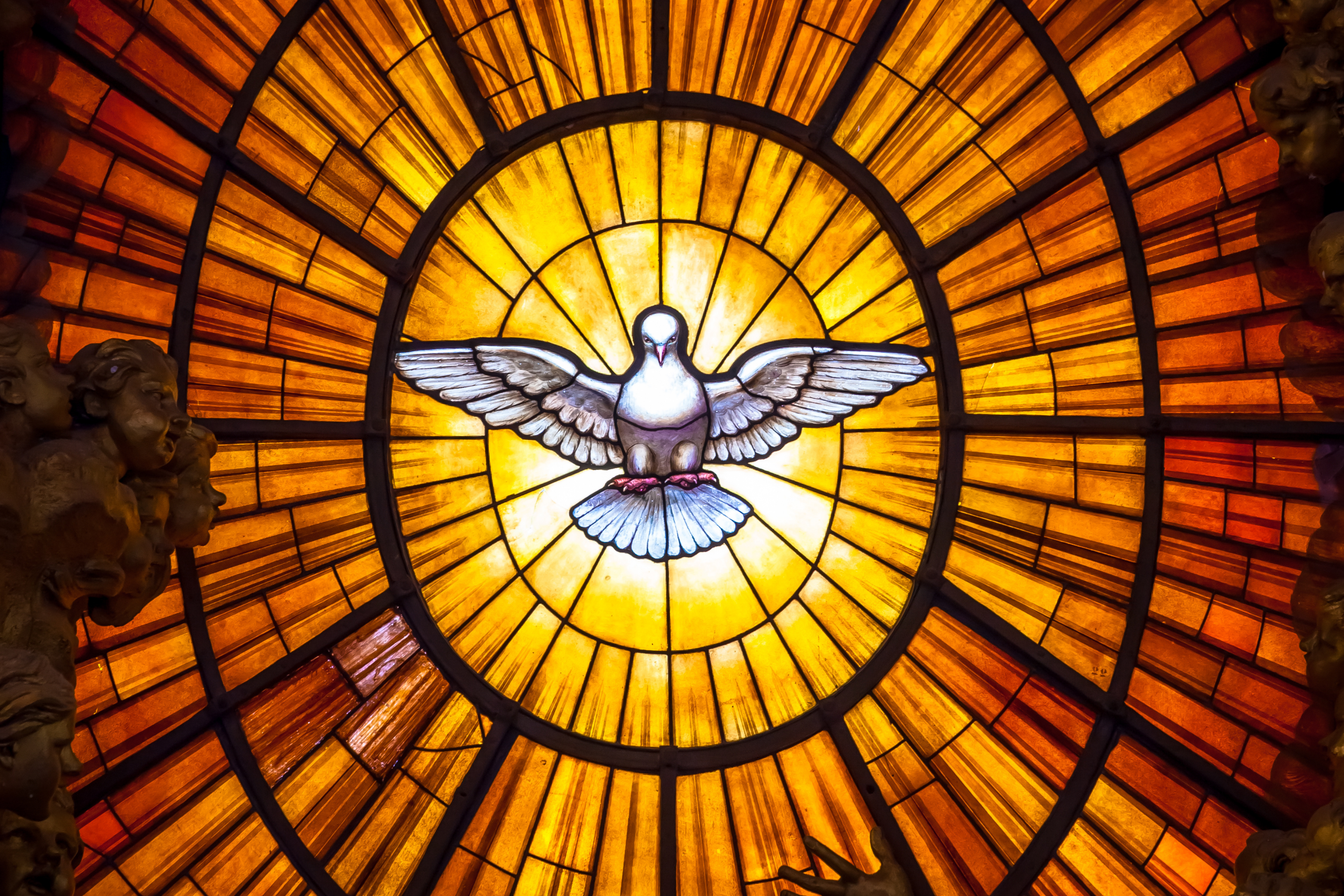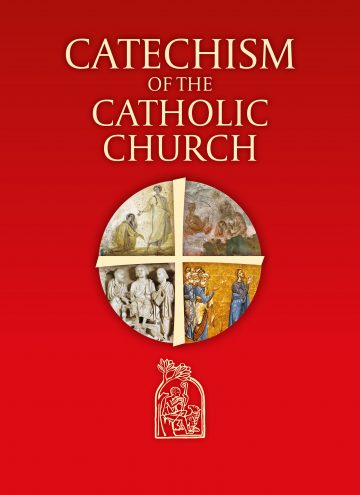What does it mean to say: I believe in the Holy Spirit?
To believe in the Holy Spirit means to worship him as God just like the Father and the Son. It means to believe that the Holy Spirit comes into our hearts so that we as children of God might know our Father in heaven. Moved by God’s Spirit, we can change the face of the earth.
Before his death, Jesus promised his disciples that he would send them “another Counselor” (Jn 14:16) when he was no longer with them. Then when the Holy Spirit was poured out upon the disciples of the original Church, they learned what Jesus had meant. They experienced a deep assurance and joy in their faith and received particular charisms; in other words, they could prophesy, heal, and work miracles. To this day there are people in the Church who possess such gifts and have these experiences.
[Learn More: See the Catechism of the Catholic Church 683–686]
What role does the Holy Spirit play in the life of Jesus?
Without the Holy Spirit, we cannot understand Jesus. In his life the presence of God’s Spirit, whom we call the Holy Spirit, was manifest in a unique way.
It was the Holy Spirit who called Jesus to life in the womb of the Virgin Mary (Mt 1:18), endorsed him as God’s beloved Son (Lk 4:16–19), guided him (Mk 1:12) and enlivened him to the end (Jn 19:30). On the Cross, Jesus breathed out his Spirit. After his Resurrection, he bestowed the Holy Spirit on his disciples (Jn 20:22). At that the Spirit of Jesus went over to his Church: “As the Father has sent me, even so I send you” (Jn 20:21).
[Learn More: CCC 689–691, 702–731]
Under what names and signs does the Holy Spirit appear?
The Holy Spirit descends upon Jesus in the form of a dove. The first Christians experience the Holy Spirit as a healing ointment, living water, a raging storm, or a flaming fire. Jesus Christ himself speaks about the Counselor, Comforter, Teacher, and Spirit of Truth. In the sacraments of the Church, the Holy Spirit is bestowed through the imposition of hands and anointing with oil.
The peace that God established in his covenant with mankind after the flood was indicated to Noah through the appearance of a dove. Pagan antiquity, too, considered the dove to be a symbol of love. And so the early Christians understood immediately why the Holy Spirit, the love of God in person, came down in the form of a dove when Jesus allowed himself to be baptized in the Jordan. Today the dove is recognized worldwide as the sign of peace and as one of the great symbols for the reconciliation of man with God (cf. Gen 8:10–11).
[Learn More: CCC 691–693]
What does it mean to say that the Holy Spirit has “spoken through the prophets”?
Already in the Old Covenant God filled men and women with the Spirit, so that they lifted up their voices for God, spoke in his name, and prepared the people for the coming of the Messiah.
In the Old Covenant God sought out men and women who were willing to let him use them to console, lead, and admonish his people. It was the Spirit of God who spoke through the mouth of Isaiah, Jeremiah, Ezekiel, and other prophets. John the Baptist, the last of these prophets, not only foresaw the coming of the Messiah. He also met him and proclaimed him as the liberator from the power of sin.
[Learn More: CCC 683–688, 702–720]
How could the Holy Spirit work in, with, and through Mary?
Mary was totally responsive and open to God (Lk 1:38). Thus she was able to become the “Mother of God” through the working of the Holy Spirit—and as Christ’s Mother to become also the Mother of Christians, indeed, the Mother of all mankind.
Mary made it possible for the Holy Spirit to work the miracle of all miracles: the Incarnation of God. She gave God her Yes: “Behold, I am the handmaid of the Lord; let it be to me according to your word” (Lk 1:38). Strengthened by the Holy Spirit, she went with Jesus through thick and thin, even to the foot of the Cross. There Jesus gave her to us all as our Mother (Jn 19:25–27).
[Learn More: CCC 721–726]
What happened on Pentecost?
Fifty days after his Resurrection, the Lord sent the Holy Spirit down from heaven upon his disciples. The age of the Church began.
On Pentecost the Holy Spirit transformed fearful apostles into courageous witnesses to Christ. In a very short time, thousands had themselves baptized: it was the birthday of the Church. The miracle of the languages on Pentecost shows that the Church is there for all peoples from the very beginning: She is universal (= the Latin term for the Greek kat’ holon, catholic) and missionary. She speaks to all men, overcomes ethnic and linguistic barriers, and can be understood by all. To this day the Holy Spirit is the “soul” of the Church, the essential principle of her life.
[Learn More: CCC 731–733]
What does the Holy Spirit do in the Church?
The Holy Spirit builds up the Church and impels her. He reminds her of her mission. He calls people into her service and sends them the necessary gifts. He leads us ever deeper into communion with the Triune God.
Even though the Church during her long history has often seemed “abandoned by all good spirits”, the Holy Spirit has been at work in her despite all the human failings and inadequacies. The mere fact of her two-thousand-year existence and the many saints of all eras and cultures are the visible proof of his presence. The Holy Spirit is the one who maintains the Church as a whole in the truth and leads her ever deeper into the knowledge of God. It is the Holy Spirit who works in the sacraments and brings Sacred Scripture to life for us. Even today he gives his gifts of grace to those who are completely receptive to him.
[Learn More: 733–741, 747]
What does the Holy Spirit do in my life?
The Holy Spirit makes me receptive to God; he teaches me to pray and helps me to be there for others.
Augustine calls the Holy Spirit “The quiet guest of our soul”. Anyone who wants to sense his presence must be quiet. Often this Guest speaks very softly within us and with us, for instance, in the voice of our conscience or through other interior and exterior promptings. Being a “temple of the Holy Spirit” means being there, body and soul, for this Guest, for God in us. Our body is therefore God’s living room, so to speak. The more receptive we are to the Holy Spirit in us, the more he becomes the master of our life, the sooner he will bestow on us even today his charisms for the upbuilding of the Church. And so, instead of the works of the flesh, the fruits of the Spirit grow in us.
[Learn More: CCC 738–741]
 This blog is extracted from YOUCAT, the Youth Catechism of the Catholic Church. For young people today with questions about Catholicism, YOUCAT has the answers. Now the bestselling Catholic book in the world, YOUCAT offers up the entirety of the Catholic Faith, as presented in the Catechism of the Catholic Church, in an accessible and contemporary way.
This blog is extracted from YOUCAT, the Youth Catechism of the Catholic Church. For young people today with questions about Catholicism, YOUCAT has the answers. Now the bestselling Catholic book in the world, YOUCAT offers up the entirety of the Catholic Faith, as presented in the Catechism of the Catholic Church, in an accessible and contemporary way.
Support the mission of CTS by ordering your copy of YOUCAT here.





